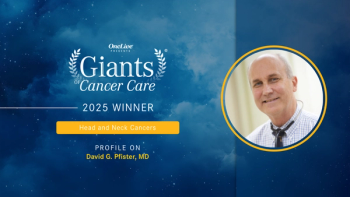
Immune-Based Approaches in the Curative Setting of HNSCC
Transcript:Ezra Cohen, MD: Viktor, we talked earlier about the curative intent setting and how we, if we can, offer a curative option. We try to for our patients. Tell us a little bit about immunotherapy moving into the locally advanced setting. What’s going on there?
Viktor Grünwald, MD: Well, I think there are also plenty of activities actually trying to combine radiotherapy and curative radiochemotherapy with immunotherapy. And I think this is a very interesting setting considering all the preclinical data that really suggest that there is a tremendous benefit. We deliver these to mice for now, but would like to do it in men. And I think that’s part of it, of the clinical trial reality that we have already. And it’s not as easy as we think. We have the data from ESMO of the combination with ipilimumab/cetuximab plus radiotherapy. There are some toxicities, there’s a certain dose that we should not cross with ipilimumab. So, there are some safety hints that it may be not a piece of cake to get through radiotherapy. And maybe cetuximab might not be the optimal part now. I wouldn’t be surprised that that would be one answer. But, I think it really has a lot of promise combining radiochemotherapy with immunotherapy. And it could be a future way in how we succeed to treat early forms of localized disease in this cancer.
Ezra Cohen, MD: And we alluded earlier to how they may cooperate mechanistically. Kevin, I don’t know if you can help shed a little bit of light on how radiation and checkpoint blockade may interplay.
Kevin Harrington, MD, PhD: Yes. I think this is a huge potential area, and to my mind as a radiation oncologist, I see this as something that we’re really obliged to do for our patients. Because, of course, it’s fantastic to have drugs that work in a second-line relapsed metastatic or first-line relapsed metastatic setting. But what I want and what the patients want is they want to be cured at the time they first present with their disease so they never have treatment in the relapsed metastatic setting.
As far as radiation is concerned, we know that radiation under certain circumstances—and these are extremely rare—can act almost like an in situ vaccination and lead to distant so-called Abscopal responses. I’ve seen those very, very seldom in my career thus far. The idea behind combining checkpoint inhibition and radiation is perhaps we could use that confluence of the 2 different mechanisms to make Abscopal responses more predictable and also more effective at a distant site. Of course, the idea of bringing these therapies together and engendering an immunologically relevant and immunogenic cell death by radiation would allow us not to treat macroscopic metastatic disease, but better still, at the time of first treatment, to get rid of micrometastatic disease that may subsequently lead to metastatic failure. But if you control that at the time of first diagnosis, the patient is cured, they never have to go through these first- and second-line regimens.
Ezra Cohen, MD: Tanguy, I was going to turn to you to talk about the interplay between chemotherapy, and you’re leading one of the major trials in that area.
Tanguy Y. Seiwert, MD: I think one additional comment that I would like to make is that you know disease burden might be important for immunotherapy. And it may be a good thing to explore, actually, when we have minimal residual disease—so, very small amounts of disease. Maybe in the adjuvant setting, there’s an additional opportunity. And so, we’re leading a multicenter study in the adjuvant setting with pembrolizumab. There’s a study, I believe through ECOG, ongoing with nivolumab. So, I think that may be an additional opportunity where maybe checkpoint inhibition is the most effective in your small amounts of disease.
With respect to the combination with chemotherapy or testing versus chemotherapy, I think there’s something intriguing with chemotherapy. We only have data on it in other diseases, like in lung cancer. But consistently in multiple diseases, adding chemotherapy to checkpoint inhibition seems to increase response rates above the chemotherapy threshold. It seems to make also progression-free survival longer, and we are actually seeing data in lung cancer from the KEYNOTE-021 study here at the ESMO 2016 meeting. And, ultimately, clinically, it makes a lot of sense. So, I think Viktor briefly alluded to that. If you have a checkpoint inhibitor, some patients may not benefit, and we actually don’t know these patients. But giving them chemotherapy might buy us time. So, it’s almost like a pharmacodynamic effect, where we have more time for the immunotherapy to work and maybe also make the immune system more strong and expose antigens, very similar to what Kevin said with radiation.
I think, unlike a lot of people who have concerns about combining chemotherapy with immunotherapy, it seems actually to work quite well, and we have one trial in head and neck cancer, that would be KEYNOTE-048. Again, I think we have to wait for the data. I would not do this outside of a clinical trial. The same is true for radiation. I think there’s a lot of question marks about those combinations. This has to be done as part of a clinical trial. And there’s always a balance with toxicities, maybe immunosuppressive effects. So, I think doing this as part of trials is really essential.
Ezra Cohen, MD: A lot of exciting data have emerged. I think we’re all very excited about what’s to come over the next few years. This has been an extremely informative session. But before we end the discussion, I’d like to get everyone’s final thoughts from each of the panelists. Dr. Grünwald, some final comments?
Viktor Grünwald, MD: I think it’s a very exciting time actually. I think after reality dictates a lack of progression in the field of head and neck cancer, we really make some advances. It really is great to see these active therapies coming to the clinic and all those opportunities that suddenly just blossomed in front of our face in all those clinical trials. So, I think that the future is bright.
Ezra Cohen, MD: Dr. Harrington?
Kevin Harrington, MD, PhD: So, I would have to echo Viktor’s comments. Absolutely, it’s a fantastic time to be working in the field of head and neck cancer oncology. I think the message that I’d like to really give is to patients. There is real cause for optimism from them as well in that there is real opportunity for benefit for all of the modalities that are used to treat them—surgically, radiotherapeutically, and with drug development. And indeed with the new wave, this fourth limb of the anticancer armamentarium anchor, immunotherapy, we’ve really got something that could have an interaction with all 3 of those treatments. So, you can perceive the potential for adjuvant therapy post surgery, combinations with radiation therapy, and then either replacement of chemotherapy or addition to chemotherapy to yield benefit. I think we’re going to see huge benefits in the next 5 to 10 years, and it will completely change the way we treat this disease.
Ezra Cohen, MD: And Dr. Seiwert?
Tanguy Y. Seiwert, MD: Well, I completely echo the notions from my colleagues that it’s an exciting time for head and neck cancer. A lot is happening. It’s an exciting time because of immunotherapy. And so, the one thing I would like to add is, immunotherapy already is a standard of care now for head and neck cancer, and I believe that we’ll see tremendous progress over the next 5 to 10 years. I think it behooves us to do this as part of clinical trials. There are great opportunities, and that’s what I think we should do. We should learn and get better.
Ezra Cohen, MD: Yes, it’s really an amazing time to be in the field, and I think we’re privileged to be at the precipice of some really remarkable changes. So, I want to thank all of you. I want to thank our panelists for the contribution to this wonderful discussion. On behalf of our panel, we thank you for joining us, and we hope you found this Peer Exchange® discussion to be useful and informative.
Transcript Edited for Clarity


































